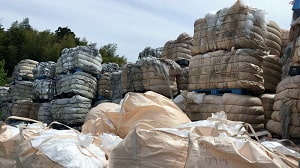Outlets for waste plastic have dried up after China banned imports this year.
TOKYO — China’s move this year to reject plastic waste is starting to have a ripple effect on Japanese traders that had depended on Chinese consumption.
One plastic scrap company in Fukuoka Prefecture filed for bankruptcy in March. “Bankruptcies and business closures of other domestic exporters will likely follow,” said Mitsuhiro Harada at Tokyo Shoko Research.Plastic scrap piles Japan China shuts door
Other companies are adjusting their strategy to fit the new reality. Ibaraki Prefecture-based Asei exports scrap plastic to a plant it runs in Shanghai, where the material is processed into pellets that are sold to Chinese buyers. But because of the ban, that factory has become unusable and will shut down before the year is out.
Because Asei is forced to process waste plastic into pellets in Japan, it is spending hundreds of millions of yen on an Ibaraki plant that will boost its monthly output of the pellets.Plastic scrap piles Japan China shuts door
The company will also set up a plant in neighboring Chiba Prefecture that will pulverize plastic scrap.Plastic scrap piles Japan China shuts door
China imported roughly 7.3 million tons of waste plastic in 2016, or over half of global exports.Plastic scrap piles Japan China shuts door
Japan shipped about 1.3 million tons to the mainland, including what came in via Hong Kong. In all, more than 80% of Japan’s exports of used plastic went to China.
The plastics are converted into everyday items. But the administration of President Xi Jinping, concerned about the air pollution that results from conversion, started this year enforcing a ban on waste plastic and paper imports first announced in 2017.
The embargo is hitting Japanese blue chips as well. Because Canon could not sell used plastics to Chinese enterprises, it sent the scrap to incinerators in Japan. Canon is currently handing off all its used plastic to Japanese recyclers, said a company official.
However, Japan is in no position to suddenly expand its capacity to recycle plastics, and a lot of the waste ends up at landfills or incinerators.Plastic scrap piles Japan China shuts door
Restrictions on used plastics are being toughened internationally, so there are few places willing to accept the waste. Some are looking to export to Southeast Asia, but Thailand is considering its own ban on imports of plastic scrap.Plastic scrap piles Japan China shuts door
Only 23% of the waste plastic produced by Japan in 2016 was turned into recycled plastic or used in fiber materials, according to the Tokyo-based Plastic Waste Management Institute. However, some companies are looking to fill that niche.
Tokyo recycler Jeplan will launch a line of apparel made from material extracted from secondhand clothes and plastic bottles. For the company, the Chinese waste plastic ban is a boon.Plastic scrap piles Japan China shuts door
“Procurement costs for plastic bottle flakes will come down,” said Jeplan CEO Masaki Takao.Plastic scrap piles Japan China shuts door

